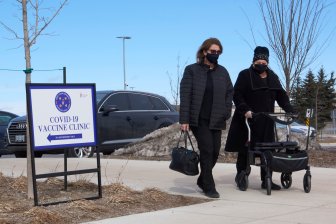News
Canada reports over 20K new COVID-19 cases amid record-breaking Omicron surge – Globalnews.ca
Canada’s two largest provinces reported record high COVID-19 case counts Thursday, as preliminary data from Britain indicated that people with the Omicron variant are up to 70 per cent less likely to need hospitalization than those with the Delta mutation.
In total, Canada added 20,192 new cases of COVID-19 on Thursday — pushing the national total to over 1.94 million infections.
Another 19 COVID-related deaths were also added by the provinces, raising the death toll to 30,131. Over 1.81 million patients have recovered from the disease however, though there are currently over active 98,000 cases.
In Quebec, the provincial government reported 9,397 new cases and a rise of 28 COVID-19-related hospitalizations, for a total of 473. The province also reported six more deaths attributed to the novel coronavirus.
As well, exponential growth in COVID-19 cases was reported in Montreal, where a top health official confirmed that one of every five tests for the virus was coming back positive. Dr. Mylene Drouin said that 60 per cent of the positive cases in Montreal were among people between the ages of 18 and 44, adding that the city’s latest data also confirm that 90 per cent of new infections involved the Omicron variant.
“The message is we are having intense community transmission in Montreal,” Drouin told a news conference. “It’s exponential, it’s touching young adults.”
Another big upswing in cases was reported Thursday in Ontario, with 5,790 new cases detected. That tally was well above the previous single-day high of 4,812 recorded back in April. Canada’s most populous province also confirmed seven new deaths attributed to the virus. In all, 400 people were recovering in hospital, including 136 who were not vaccinated.
Despite the big increase in Ontario, an expert says the latest numbers represent a poor guess because testing is not keeping up with the Omicron-driven fifth wave of the pandemic.
“In all likelihood, you’d have to multiply these numbers at least three or four times to get a sense of what’s actually happening,” said. Dr. Fahad Razaka, a member of the province’s science table.
Prince Edward Island also posted a new record for its daily case count on Thursday with 35. That prompted the Island’s government to ban all wedding receptions, funeral receptions and wakes as of Friday at 8 a.m.
Records were also broken in Nova Scotia, British Columbia and New Brunswick.
Several provinces recently reinstated stricter public health measures in response to Omicron, including caps on social gatherings and closures of some businesses.

Public health restrictions were tightened Thursday in Iqaluit. They include a ban on non-essential travel in and out of the city. Officials said the changes were necessary because a case of COVID-19 had been detected in a person who had not left Iqaluit for more than a month, a likely sign of community transmission.
The Manitoba government said Thursday that COVID-19 testing is so backed up in the province that case counts have been under-reported. The government asked that only Manitobans experiencing COVID-19, cold or flu-like symptoms should seek testing.
Alberta said it is adjusting its COVID-19 testing rules to cope with the ongoing soaring rise in cases driven by Omicron.
Dr. Deena Hinshaw, the chief medical officer of health, urged Albertans with COVID-19 symptoms to rely on the rapid antigen tests rather than the more accurate PCR tests to free up resources for those in higher priority settings, such as those in continuing care.
Meanwhile, the latest findings from the U.K. Health Security Agency add to emerging evidence that Omicron produces milder illness than other variants, though it spreads faster and better evades vaccines. The agency said that based on cases in the U.K., an individual with Omicron is estimated to be “50 to 70 per cent less likely to be admitted to hospital” when compared with a person infected with the Delta variant.
The agency, however, cautioned that the analysis is preliminary and “highly uncertain” because of the small number of Omicron patients in hospitals and the fact that most cases involved younger age groups. The research said the protection a vaccine booster shot gives against Omicron infections appears to wane after about 10 weeks, though protection against hospitalization and severe disease is likely to hold up for longer.
The analysis follows two studies from Imperial College London and Scottish researchers that found patients with Omicron were between 20 per cent and 68 per cent less likely to require hospital treatment than those with Delta.
“Cautious optimism is perhaps the best way to look at this,” said Manuel Ascano Jr., a biochemist who studies viruses at Vanderbilt University in Nashville, Tenn.
Canada’s public health officer, Dr. Theresa Tam, has confirmed the Omicron variant has become the dominant mutation of COVID-19 in several provinces. Infections across Canada have risen from an average of 5,000 per day last week to more than 11,000 this week, which is why Tam has called for urgent action to curb the spread of Omicron.
Meanwhile in Saskatchewan, the Opposition New Democrats asked why the government has yet to announce new measures to deal with Omicron.

NDP Leader Ryan Meili said he couldn’t understand why Saskatchewan is the only province that hasn’t taken any new steps, even though the government’s modelling suggests Omicron cases could skyrocket over the next few weeks.
Premier Scott Moe later defended the province’s decision to forgo stronger restrictions because of low COVID-19 hospitalizations and manageable case numbers. Moe said his government is tracking the situation daily and hasn’t ruled out introducing additional measures about large gathering sizes next week.
In British Columbia, the province reported 2,046 new COVID-19 infections on Thursday, eclipsing the previous record set the day before as the Omicron variant spreads. The province says 975 cases of the highly transmissible variant have been confirmed so far, with more than half in the Vancouver Coastal Health region.
© 2021 The Canadian Press
News
We're still stockpiling reusable bags. Big grocers have adopted solutions, but experts have concerns – CBC News
Canada’s plastic bag ban has had an unintended consequence: a proliferation of reusable bags piling up in basements, closets and, eventually, landfills.
“They’re everywhere,” said environmental researcher Tony Walker. “We’re drowning in them, and we shouldn’t be.”
To combat the problem, several of Canada’s big grocers have introduced solutions. Last week, Walmart launched a free national recycling pilot program for the retailer’s reusable blue bags. Competitors Sobeys and chains owned by Loblaw Companies Ltd. use recyclable paper bags for grocery delivery.
But some environmental experts argue that paper bags are also problematic and that the best solutions are those that help customers actually reuse their reusable bags.
“We just can’t keep giving [them] out,” said Walker, a professor at Dalhousie University’s School for Resource and Environmental Studies in Halifax. “We’re only meant to have a few of them, and we’re meant to use them until they fall apart.”
In late 2022, the federal government rolled out a ban on the manufacture, import and sale of several single-use plastics, including checkout bags. The regulations are being contested in court, but in the meantime, they remain in effect.


The regulations have made single-use shopping bags scarce in Canada, but they’ve also led to the proliferation of reusable bags, especially for grocery delivery.
“It just creates more waste, which is what we’re trying to avoid in the first place,” Walmart customer Udi Sela said in a CBC News interview in late 2022.
At the time, Sela, who lives in Maple, Ont., estimated his family had acquired about 300 reusable Walmart bags via grocery delivery.
“We can’t return them, we can’t do much with them.”
Now, a little more than a year later, Walmart has launched a pilot project to address the problem.
It allows customers to pack up their unwanted reusable Walmart blue bags and ship them — at no charge — to a facility where they’ll get a second life.
How it works
According to Walmart, bags in good condition will be laundered and donated to charity, primarily Food Banks Canada. Damaged bags will get recycled into other materials. Reusable bags typically can’t go in blue bins because they’re costly and difficult to recycle.
Customers must sign up for Walmart’s program, and enrolment is limited.
Jennifer Barbazza, Walmart’s senior manager of sustainability, said the retailer will fine-tune the details as the program progresses.
“[We] know that some customers have more reusable bags than maybe they need,” she said. “One of the things that we’re really excited to learn about from the pilot is customer acceptance and customer feedback.”
Reusable bags are living rent free in closets and car trunks across the country. Most major retailers made the switch away from single-use plastic bags about a year ago, but it’s taking time for some customers to catch on. They’re forgetting to bring their bags with them, and buying more every week.
Udi Sela has already signed up.
“I definitely think it’s a step in the right direction,” he said in an interview on Friday. “It’s something that needed to be done a while ago. God knows we’ve got a ton of bags kind of piled up.”
He said he’s concerned that some customers may find mailing the bags a hurdle. However, it’s not deterring Sela, who soon plans to ship hundreds.
Passing the buck?
Not everyone is keen on Walmart’s project. Emily Alfred, a waste campaigner with Toronto Environmental Alliance, said donating the bags to the food bank is just passing on the problem.
“We need to remove waste from the system entirely, and just sending these somewhere else for someone else to deal with is not really a solution,” she said.
Alfred said a better option is a program Walmart piloted in Guelph, Ont., in 2022. For a fee, customers could check out reusable bags from an in-store kiosk and later return them to be cleaned and reused.
“That’s a real circular reuse system,” she said.


Walmart’s Barbazza said the retailer is continuing to explore different reusable bag programs, including ones placed in stores.
She also said she’s confident Canada’s food banks will make good use of the bags.
“There’s definitely a need for sturdy items to distribute materials to the food bank clients.”
The paper problem
Among Canada’s major grocers, only Walmart offers a reusable bag program for all customers.
Loblaw recently switched from reusable to recyclable paper bags for grocery delivery. Sobeys did not respond to requests for comment, but according to its website, the grocer also uses paper bags and “reusable options” for home delivery.
Several environmental experts say paper bags aren’t a good solution, because their production leaves a sizable carbon footprint.
“Paper bags are a problem,” Alfred said. “It takes a lot of energy to recycle paper, takes a lot of trees and energy to make new paper.”
Loblaw said it continues to explore a variety of more sustainable solutions. “It’s a challenge we’re committed to addressing,” spokesperson Dave Bauer said in an email.


Both Walker and Alfred applaud Metro for its grocery delivery program, because the grocer, which operates in Ontario and Quebec, reuses delivery materials.
Metro said customers can get their goods delivered in a cardboard box or reusable bags, which can be returned and used for another delivery. Or customers can opt for a plastic bin and remove their groceries from it upon arrival.
Metro does not offer similar programs for in-store shoppers.
Alfred said the federal government should introduce regulations that mandate retailers adopt effective reusable bag programs for all customers.
“It’s up to our governments and people to demand that these companies do better,” she said.
But Walker suggested that the regulations would be hard to enforce and that incentives could be a better tactic.
For example, if retailers increased the price of reusable bags, shoppers might be less likely to forget them when they head to the store, he said.
“When the cost is a disincentive to do an activity, people change their behaviour.”
News
CTV National News: Honda's big move in Canada – CTV News
[unable to retrieve full-text content]
CTV National News: Honda’s big move in Canada CTV News





Source link
News
Freeland defends budget measures, as premiers push back on federal involvement – CBC News
Deputy Prime Minister and Finance Minister Chrystia Freeland says she thinks unhappy premiers will come around on measures in the federal budget that touch on provincial legislation, even as they push back.
At an event in Toronto on Sunday, Freeland — who presented the federal budget on Tuesday — said the national government needs to push ahead on such issues as housing and she was “extremely optimistic” premiers would choose to co-operate.
“Housing is a national challenge, and the federal government needs to be leading the charge,” she said.
“My own experience has been when there are big issues that really matter to Canadians, after all the sound and the fury, people are prepared to roll up their sleeves and find a win-win outcome for Canadians.”
Several premiers have pushed back against the federal government in recent months and again after the budget was released on the grounds that some measures touch on provincial jurisdiction.
This week’s federal budget has premiers lashing out at Prime Minister Justin Trudeau over a planned increase to capital gains taxes as well as what they say is overstepping on infrastructure and pharmacare.
In a letter released Friday by the Council of the Federation, which represents the leaders of all 13 provinces and territories, the premiers said Ottawa should have consulted them more ahead of the budget.
Individual premiers have shared more pointed critiques.
“It’s a never-ending spending platform that we’ve seen now for the last 10 years,” New Brunswick Premier Blaine Higgs said on CBC’s Power & Politics on Friday.
“My initial thoughts about the federal budget are that they are overtaxing, overspending, overborrowing and over interfering in provincial affairs,” Alberta Premier Danielle Smith said earlier this week.
Alberta has clashed with the government repeatedly over housing. Smith introduced legislation earlier this month that would require provincial oversight of deals made between municipalities and the federal government, including for future agreements around federal housing funds.
At Issue this week: The Liberals work to sell their multibillion-dollar spending plan and capital gains tax hike. Pierre Poilievre tells Radio-Canada what he thinks of the federal budget. And another province pushes back on the carbon tax.
Freeland said on Sunday that, as an example, the federal child-care program negotiated through a series of deals with provinces and territories showed that co-operation was possible.
Capital gains tax changes criticized
The federal government has also faced some opposition on what was perhaps the most prominent measure revealed on budget day: changes to Canada’s capital gains tax rules. The government has proposed raising the inclusion rate to 67 per cent on capital gains above $250,000 for individuals.
“The 21st-century winner-takes-all-economy is making those at the very top richer, while too many middle-class Canadians are struggling,” Freeland said Sunday, adding the government was asking wealthy Canadians to pay their “fair share.”
“We do need to ensure that we have some revenue coming in. This is a very limited way of ensuring that that occurs,” Treasury Board President Anita Anand said in an interview on Rosemary Barton Live on Sunday.
Treasury Board President Anita Anand joins CBC chief political correspondent Rosemary Barton to talk about the federal budget and its focus on young Canadians — as well as the criticism it’s receiving.
Critics have raised concerns that the changes could result in reduced investment or capital flight.
“The big concern right now … is this going to have a detrimental impact to the progress we’re trying to make in making Canada a hub for innovation,” said Kirk Simpson, CEO of the tech company goConfirm, in a separate interview on Rosemary Barton Live.
“With productivity the way that it is, we want more capital, not less, flowing into business innovation,” Simpson told CBC chief political correspondent Rosemary Barton.
Freeland said Sunday that the changes will affect very few Canadian individuals — the government estimates 0.13 per cent — and the revenue will go to pay for investments in areas like housing.
-
Business11 hours ago
Honda to build electric vehicles and battery plant in Ontario, sources say – Global News
-



 Science12 hours ago
Science12 hours agoWill We Know if TRAPPIST-1e has Life? – Universe Today
-
Investment15 hours ago
Down 80%, Is Carnival Stock a Once-in-a-Generation Investment Opportunity?
-
News16 hours ago
Honda expected to announce multi-billion dollar deal to assemble EVs in Ontario
-



 Sports21 hours ago
Sports21 hours agoJets score 7, hold off Avalanche in Game 1 of West 1st Round – NHL.com
-



 Tech15 hours ago
Tech15 hours agoIndigenous Craft and Vendors Market a success in Halifax
-



 Science17 hours ago
Science17 hours agoWatch The World’s First Flying Canoe Take Off
-
News15 hours ago
Can Canada have an effective climate action policy without a carbon tax?











